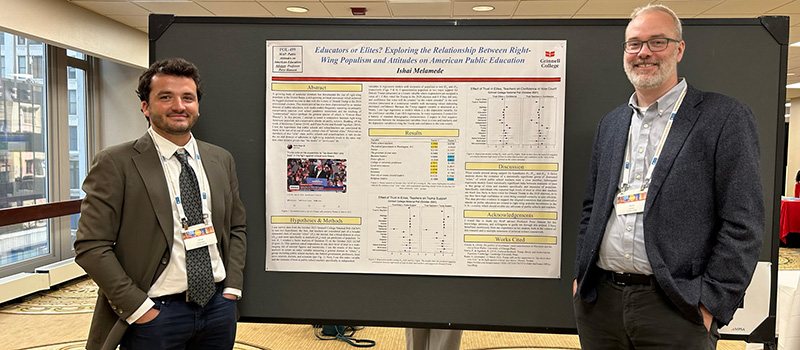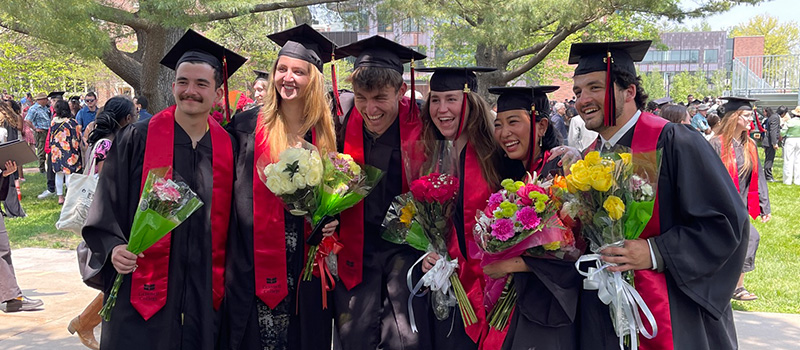One year after graduation, Ishai Melamede ’23 discovering the why in polling
August 1, 2024 — When Ishai Melamede ’23 first came to Grinnell from Brooklyn, New York, he was “keenly aware that there was a big, big part of the country that I really had no idea about.”
Now, just over a year from graduation, he works as a research assistant at Langer Research Associates and has the opportunity to learn “why people think the way they do” through polling not just across this big country, but the whole world.
Langer Research Associates, founded by longtime ABC News polling director Gary Langer, is one of the most respected public opinion research and polling firms in the U.S. When Melamede came aboard last fall, one of the first projects he worked on is the Pew Research Center’s Global Attitudes project.
 Ishai Melamede ’23, left, and Peter Hanson, associate professor of political science, present their findings at the 2023 Midwest Political Science Association conference in Chicago.
Ishai Melamede ’23, left, and Peter Hanson, associate professor of political science, present their findings at the 2023 Midwest Political Science Association conference in Chicago.
“There are relatively few methodologically rigorous studies that ask the same questions at the same time to people in so many different contexts,” he says. “We were figuring out things like ‘How do you actually get a random sample of people in India?’ It’s a country of over a billion people and hundreds of languages,” he says. “All of it is in service of trying to give everybody an equal chance of being selected to participate, as feasibly as possible, to capture what people are saying.”
How did Melamede come to find himself in such a position? “One lesson I learned pretty early on at Grinnell is that you should take classes with people that you found fascinating rather than on subject matters you found fascinating,” he says. This led him to taking a class with Peter Hanson, associate professor of political science, where the Grinnell College National Poll played a central role. Hanson is the poll’s director.
Melamede says he was never particularly taken with the natural sciences as subjects, but he enjoyed the process and method to them. “You have a question, you think of a systematic way to answer that question, you test it, you evaluate your test, and then you try again,” he says.
Melamede found the Grinnell College National Poll to be the happy medium between the subject matter that interested him and the scientific method. “That’s the conceit that drew me into polling initially, and I kept going from there.” Melamede began working on the College poll, eventually serving as one of the poll’s board members, working closely with legendary Iowa pollster J. Ann Selzer, and evaluating the draft versions of the poll questions.
Hanson and Melamede went on to have “a productive partnership” including a teaching assistantship, a Mentored Advance Project, and articles that have zeroed in on people’s attitudes on public education.
 Melamede, right, poses with his 2023 classmates Mack Trachtenberg, left, Eliza Meyer, Jacob Cowan, Mallory Graham, and Eunice Lee at Commencement last year.
Melamede, right, poses with his 2023 classmates Mack Trachtenberg, left, Eliza Meyer, Jacob Cowan, Mallory Graham, and Eunice Lee at Commencement last year.
It’s a topic that’s close to home for Melamede, whose parents are both teachers (his father teaches third grade in a New York City public school and his mother is a professor at the City University of New York). Melamede and Hanson were particularly interested when school board meetings became contentious during the pandemic.
“We thought intuitively that there might be a connection between right wing populism and fury at public schools, but we wanted to establish it a bit more seriously and try to think about what the nature of that connection might be,” he says. “We decided to explore a central tenet of populism, which is this generalized distrust of elites.” Their research has shown that public school teachers are increasingly being considered “elites” despite the democratic values at the heart of public education and the long history of under resourced public schools. “That was interesting and viscerally shocking,” he says.
Since education is such a central idea to so much of our world, it provides a unique window into where people are. “People have sort of professed certain values, but when their kids are on the line, it really starts to bear out what they think,” Melamede says. “You can’t blame people for wanting what’s best for their kid, so the crux of the issue is how do people make decisions about what’s best for their kid.” Later this fall, Melamede says he and Hanson will be presenting “a more developed version” of their work at a conference in Philadelphia.
Fascinating professors teaching their interests also led Melamede to Gemma Sala, associate professor of political science. Sala’s nationalism course “totally changed how I see the world,” he says given nationalism’s inherent contradiction of being “both so flimsy and fabricated and yet so powerful and compelling.” Melamede’s interest in these contradictions played a role in his paper on an anti-Zionist, Israeli activist’s tour of the U.S. in the 1970s, which took home the College’s Lura Camery Prize last year for an “outstanding work of historical interpretation (concerning the non-English-speaking world).”
A political science major with a concentration in peace and conflict studies, Melamede made the most of his three years at Grinnell. He edited the Grinnell Underground Magazine (GUM), helped take the open Ultimate Frisbee team to nationals, joined Phi Beta Kappa, and worked at the UCC Preschool in downtown Grinnell. That experience gave him the refreshing chance to get to know many people in the Grinnell community without ties to the College.
This fall, when it may feel like a new poll is dropping every minute, Melamede encourages readers to focus on “the trends over time” rather than the horse race polling numbers themselves. There will be winners and losers, candidates will be up and down, but “what’s interesting is the motivation behind people’s decisions. Looking at polling through that lens,” he says, “is what’s more fruitful.”
— by Joe Engleman ’14